Missing Voices reports drop in police killings in Kenya but says gaps remain

Missing Voices further reported that the number of victims of enforced disappearances also decreased, from 22 in 2022 to 10 last year.
The annual Missing Voices report on alleged extrajudicial killings in Kenya shows that the number of victims decreased from 130 in 2022 to 118 last year.
Missing Voices, which launched its annual report at the Heinrich Boll Foundation in Nairobi on Wednesday, further reported that the number of victims of enforced disappearances also decreased, from 22 in 2022 to 10 last year.
More To Read
- 73% of Kenyans believe government not doing enough to stop abductions, extra-judicial killings - TIFA Report
- LSK demands urgent probe into abductions of lawyers, warns of persecution
- Matiang’i calls for public inquest into extrajudicial killings
- Rights groups raise alarm over police brutality, delayed justice
- Kenya’s police still kill with impunity – what needs to be done to stop them
- IJM condemns killing of 17-year-old girl in Kilifi, calls for justice and action against femicide
Men remained the majority of the victims, accounting for 94 per cent of the total, a one per cent drop compared to last year.
"The proportion of women was recorded at 4.7 per cent in 2022, compared to 6 per cent in 2023," the report states.
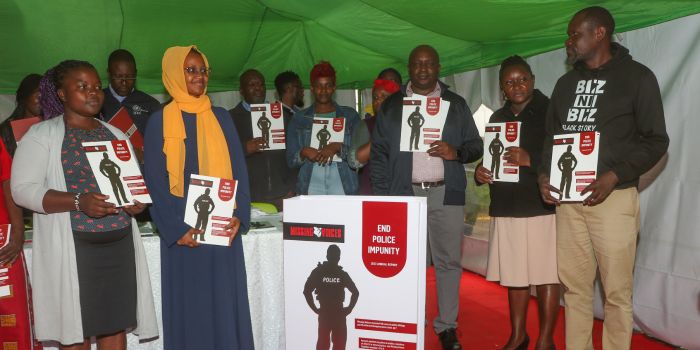 Members of the public display the yearly Missing Voices report, on extrajudicial killings and forced disappearances in Kenya, following its launch at the Heinrich Boll Foundation in Nairobi on April 24, 2024. (Photo: Justine Ondieki)
Members of the public display the yearly Missing Voices report, on extrajudicial killings and forced disappearances in Kenya, following its launch at the Heinrich Boll Foundation in Nairobi on April 24, 2024. (Photo: Justine Ondieki)
Missing Voices is a coalition of human rights organisations that tracks cases of police excesses in the country.
The organisations include the International Justice Mission-Kenya (IJM-Kenya), Amnesty International, the International Commission of Jurists (ICJ), Defenders Coalition, and Protection International Kenya.
Others are the International Center for Transitional Justice (ICTJ), the Independent Medico-Legal Unit (IMLU), the Kenya Human Rights Commission (KHRC), Kituo cha Sheria, Code for Africa, Heinrich Boll Foundation, PBI, Haki Africa and Human Rights Watch.
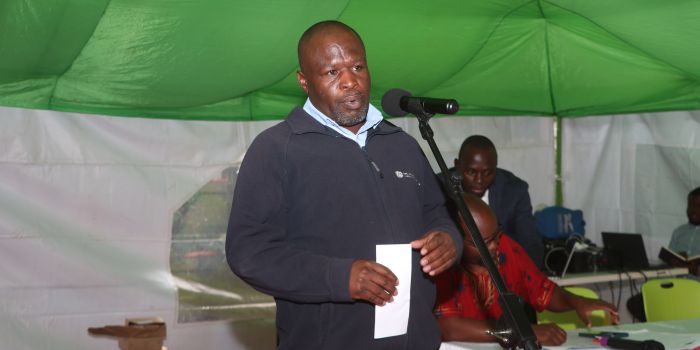 Cornelius Oduor, the deputy executive director of the Kenya Human Rights Commission (KHRC), addresses the launch of the yearly Missing Voices report, on extrajudicial killings and forced disappearances in Kenya, at the Heinrich Boll Foundation in Nairobi on April 24, 2024. (Photo: Justine Ondieki)
Cornelius Oduor, the deputy executive director of the Kenya Human Rights Commission (KHRC), addresses the launch of the yearly Missing Voices report, on extrajudicial killings and forced disappearances in Kenya, at the Heinrich Boll Foundation in Nairobi on April 24, 2024. (Photo: Justine Ondieki)
The coalition's survey also noted that most of the killings occurred during anti-crime operations by state security agencies, which accounted for 58 deaths in 2023 compared to 91 the previous year.
A major milestone noted in the 2022 report was the successful prosecution of the killers of IJM-Kenya's human rights lawyer Willie Kimani and two others.
Kimani, his client Josephat Mwenda and taxi driver Joseph Muiruri were killed on June 23, 2016. In February 2023, about seven years later, former police officer Sergeant Fredrick Ole Leliman was sentenced to death over the killings, while police officers Stephen Cheburet and Sylvia Wanjiku got 30 and 24 years in jail, respectively.
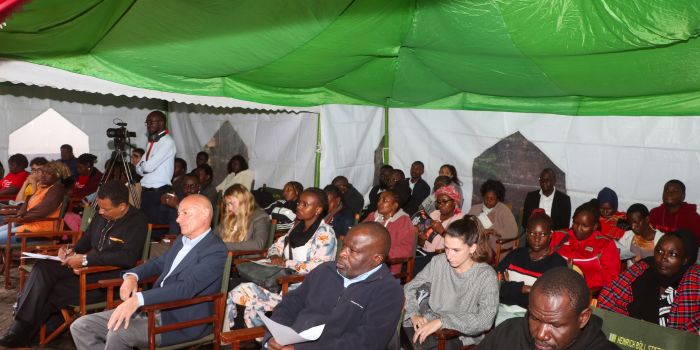 Members of the public attend the launch of the yearly Missing Voices report, on extrajudicial killings and forced disappearances in Kenya, at the Heinrich Boll Foundation in Nairobi on April 24, 2024. (Photo: Justine Ondieki)
Members of the public attend the launch of the yearly Missing Voices report, on extrajudicial killings and forced disappearances in Kenya, at the Heinrich Boll Foundation in Nairobi on April 24, 2024. (Photo: Justine Ondieki)
This year, Missing Voices also observed the arrest and prosecution of Pangani police officer Rashid Ahmed for the killing of Jamal Mohamed and Mohamed Dahir Kheri as a marker of key progress in the fight against police impunity, alongside the presentation of the report of Rtd Justice David Maraga's National Taskforce on Police Reforms to the President for action.
"The third happening was the commitment made by the Attorney General, Justin Muturi, on Kenya's possible ratification of the International Convention for the Protection of All Persons from Enforced Disappearance," the report states.
Emerging concerns
The coalition further noted emerging trends in extrajudicial killings, adding that despite President William Ruto's pledge to end the crime, it continues to take place in various forms.
It cited the suspicious killing of three people allegedly linked to a violent robbery in Eastleigh, in which a businessman was seriously shot and wounded and his Sh4 million in US dollars stolen, and the subsequent arraignment of other suspects in court in connection to the incident.
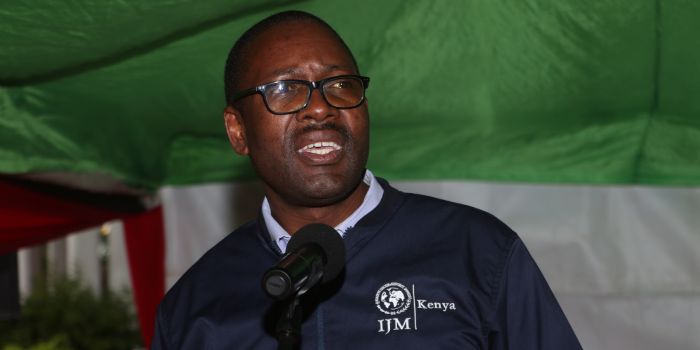 IJM-Kenya Director Benson Shamala addresses the launch of the yearly Missing Voices report, on extrajudicial killings and forced disappearances in Kenya, at the Heinrich Boll Foundation in Nairobi on April 24, 2024. (Photo: Justine Ondieki)
IJM-Kenya Director Benson Shamala addresses the launch of the yearly Missing Voices report, on extrajudicial killings and forced disappearances in Kenya, at the Heinrich Boll Foundation in Nairobi on April 24, 2024. (Photo: Justine Ondieki)
The coalition further called out the recent transfer of tens of detectives from the Internal Affairs Unit (IAU), saying it threatens to destabilise the unit that has played a key role in probing police excesses in the country.
"One of the issues that concern us is that the IAU continues to be weakened. In the past, we have seen transfers within a short period of the directors of the unit as a way of weakening the institution to an extent that it cannot carry out its mandate," the report said.
"We are also aware of the transfers of over 50 police officers from the unit, some of whom were investigating very serious crimes of police abuse. We are calling upon the inspector-general to review this stand and give the unit a budget to fully execute its mandate," said IJM-Kenya Director Benson Shamala.
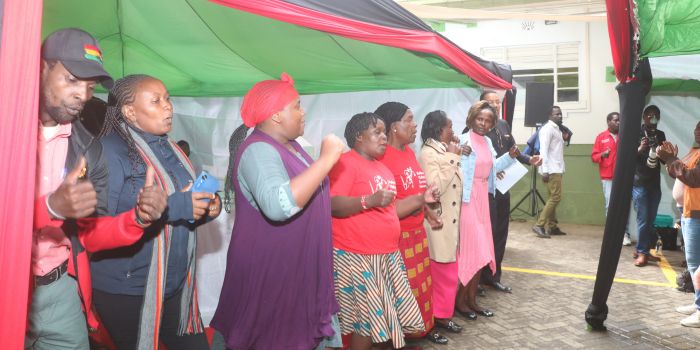 Members of the public attend the launch of the yearly Missing Voices report, on extrajudicial killings and forced disappearances in Kenya, at the Heinrich Boll Foundation in Nairobi on April 24, 2024. (Photo: Justine Ondieki)
Members of the public attend the launch of the yearly Missing Voices report, on extrajudicial killings and forced disappearances in Kenya, at the Heinrich Boll Foundation in Nairobi on April 24, 2024. (Photo: Justine Ondieki)
The unit successfully probed the killing of two Indians, who visited Kenya to help the United Democratic Alliance (UDA) during the 2022 general elections, and their taxi driver.
Justice Maraga's report recommended the strengthening of the unit, citing its key role in enforcing discipline within the National Police Service.
Amnesty Kenya Director Irungu Houghton criticised the National Police Service for various reasons.
"A professional public-centred public service has one responsibility besides the protection of lives, property and the upholding of human rights, and that is to provide information on the activities revolving around their work," Houghton said
"One thing that has always shocked me about the National Police Service of Kenya is that they do not release to the public data on how many people police officers have killed, what happened to disciplinary processes involving those officers, and the steps they are taking to reduce the numbers of people who are either extrajudicially killed or forcefully disappeared."
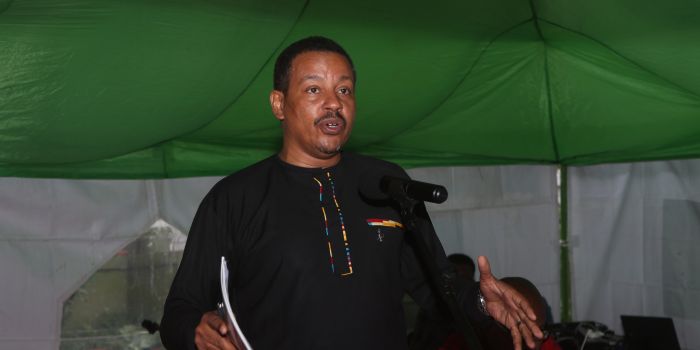 Amnesty International Executive Director Irungu Houghton addresses the launch of the yearly Missing Voices report, on extrajudicial killings and forced disappearances in Kenya, at the Heinrich Boll Foundation in Nairobi on April 24, 2024. (Photo: Justine Ondieki)
Amnesty International Executive Director Irungu Houghton addresses the launch of the yearly Missing Voices report, on extrajudicial killings and forced disappearances in Kenya, at the Heinrich Boll Foundation in Nairobi on April 24, 2024. (Photo: Justine Ondieki)
The report called on AG Muturi to take action, including operationalising the National Coroners Service Act and the Prevention of Torture Act and fast-tracking court awards to victims of police killings.
It also called on the Director of Public Prosecutions (DPP) to expedite ongoing court cases related to the matter, develop guidelines on investigations into police killings, develop a habeas corpus guideline with state oversight agencies, the Judiciary and human rights agencies, as well as quicken the development of jurisprudence on prime responsibility and the command of responsibility.
Top Stories Today
















































